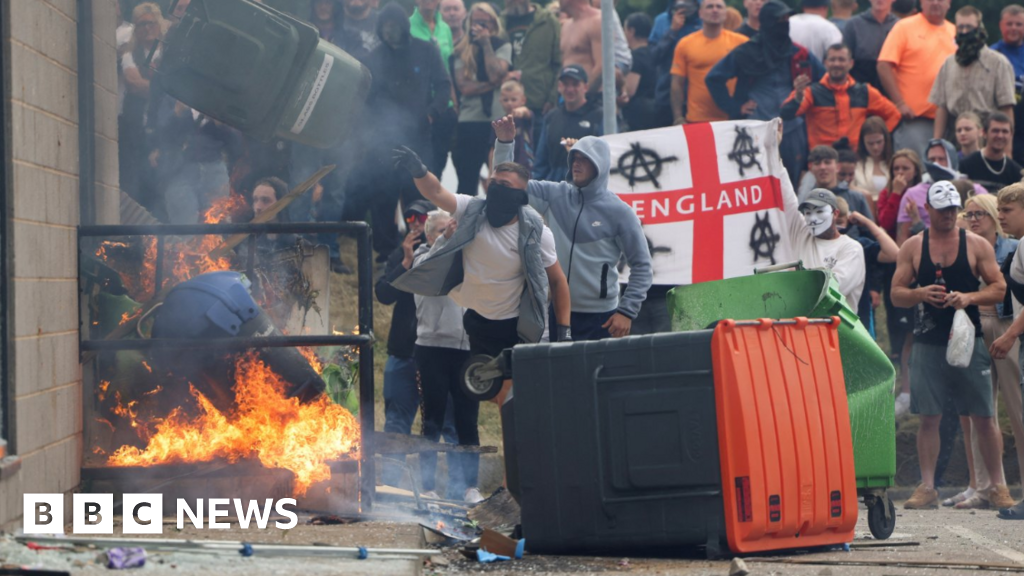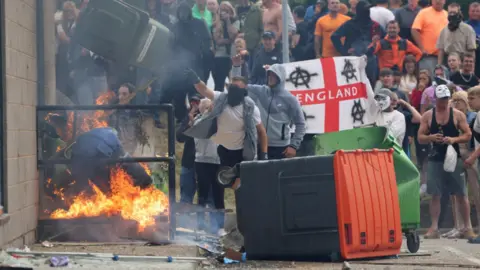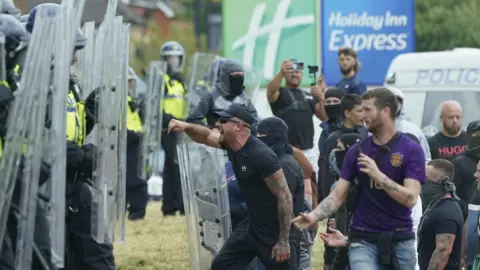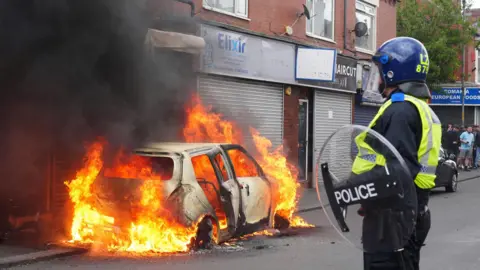UK protests: No 10 to hold Cobra meeting over escalating violence

Downing Street has confirmed there will be an emergency response meeting on Monday after more than 150 people were arrested following violent disorder in UK towns and cities over the weekend.
It comes after Sir Keir Starmer condemned an attack on a hotel housing asylum seekers in Rotherham and promised those involved in unrest would face “the full force of the law”.
Police responded to violent scenes in Rotherham, Middlesbrough, Bolton and other parts of the UK on Sunday.
The Cobra meeting follows some of the worst rioting the UK has seen in recent years, in the wake of the fatal stabbing of three young girls in Southport last week.
 Reuters
ReutersVarious parts of England and Northern Ireland have seen violence break out in the days since, which politicians say has been fuelled by misinformation on social media and far-right groups inflaming tensions.
Cobra – or COBR – meetings are named after Cabinet Office Briefing Room A on Whitehall.
It is an emergency response committee – a get together of ministers, civil servants, the police, intelligence officers and other officials appropriate to the situation they are looking into.
Monday’s meeting will be intended to provide the government with an update on the violence over the weekend and the response in the coming days. It will involve relevant ministers and police representatives.
Sources have suggested this should be seen in the context of meetings that have already taken place, such as one between the prime minister and police chiefs last Thursday, and a meeting of senior ministers on Saturday.
Home Secretary Yvette Cooper said there are “obviously” issues around social media, which acts as a “rocket booster behind both the spread of misinformation and also the organisation of this violence.”
“Social media companies need to take some responsibility; we also need to make sure that criminal activity online is being pursued”, she told BBC Breakfast.
 PA
PAWhen asked about the founder of the far-right English Defence League, Tommy Robinson – whose real name is Stephen Yaxley-Lennon – spreading misinformation online, Ms Cooper said while she can not comment on specific people, “if it’s a crime offline, it’s a crime online.”
“You can’t just have the the armchair thuggery or the people being able to incite and organise violence and also not face consequences for this,” she told BBC Radio 4’s Today Programme.
During the prime minister’s televised address on Sunday, he warned those involved that they will “regret” taking part.
Sir Keir said: “People in this country have a right to be safe, and yet we’ve seen Muslim communities targeted, attacks on mosques… Other minority communities singled out, Nazi salutes in the street, attacks on the police, wanton violence alongside racist rhetoric, so no, I won’t shy away from calling it what it is: far-right thuggery.”
In a statement, the Home Office offered mosques greater protections as part of a new process, under which it said “rapid security” deployment can be requested in order to allow a return to worship as fast as possible.
In Rotherham, six arrests have been made and one person has been charged following Sunday’s rioting, South Yorkshire police said.
The force also said at least 12 police officers were injured, with one left unconscious, after anti-immigration demonstrators threw planks of wood at officers and sprayed them with fire extinguishers.
Assistant Chief Constable Lindsey Butterfield added: “Our police dogs suffered minor injuries after missiles were launched at them and horses had bricks, eggs, bottles and beer cans thrown at their heads.
“They were spat at and threats made to cut the saddles in an attempt to injure the riders.”
Some members of the 700-large group smashed windows to gain access to a Holiday Inn Express and a large bin was set alight.
The officer knocked unconscious suffered a head injury, the force said, adding that at least two others had suspected broken bones.
Hotel employees and residents, some of whom are asylum seekers, were “terrified”, but no injuries were reported, police said.
The Mayor of South Yorkshire Oliver Coppard said there were “240 people” in the hotel when it was attacked.
“[The asylum seekers] have faced violence and persecution in their home countries and have come here as a result and yet they have now faced that violence here – I can’t imagine how terrified they must have been,” he told Today.
The asylum seekers were all evacuated to safety, Mr Coppard added.
Ms Cooper called the scenes “utterly appalling” and said police have government backing to take “the strongest action”.
At a second hotel in Tamworth, Staffordshire, officers said they had to deal with “violent acts of thuggery” on Sunday evening.
One officer was injured at the site as people threw missiles, smashed windows, and started fires, Staffordshire Police said.
Meanwhile, a group of rioters in Middlesbrough smashed the windows of houses and cars and hurled objects at officers.
Forty-three people have been arrested following the “staggering” violence witnessed there, David Felton, the assistant Chief Constable of Cleveland Police, said. He added that police officers will remain in the area throughout the day.
 PA
PAMerseyside Police have said five more people have been charged in connection to the disorder witnessed in Liverpool, including a 14-year-old boy.
In Dorset, 600 people from opposing sides gathered on the seafront in Weymouth. Officers said there had been a “small number of low-level incidents”, with one man arrested for a public order offence.
And in Bolton, anti-immigration protestors were confronted by a group of up to 300 masked people shouting “Allahu Akbar” – or “God is greatest”.
Greater Manchester Police issued a Section 60AA order in the town which requires people to “remove face coverings used to disguise or conceal their appearance”.
The violence followed similar scenes of unrest in Southport, Belfast, Hartlepool, Hull, Liverpool, Stoke-on-Trent, Nottingham, Sunderland and elsewhere earlier in the week.
Sir Keir indicated the response to the violence could mirror elements of the handling of the riots in 2011, when he was director of public prosecutions.
“We do have standing arrangements for law enforcement, which means that we can get arrests… and convictions done very quickly,” the PM said.
“I myself was part of that in 2011 when I was director of public prosecutions, and I’m determined we will do whatever it takes to bring these thugs to justice as quickly as possible.”
Ministers have suggested that courts could sit 24 hours to fast-track prosecutions – as they did in 2011 – while police forces have measures in place to draft in extra officers to tackle potential unrest.
Shadow Home Secretary James Cleverly said his party would support the government in bringing the perpetrators to justice, but that “key decisions could and should have been made earlier.
“The fact that most of yesterday we were still not sure whether the prime minister would or would not be going on holiday, I don’t think sends a good signal”, he told Today.
“I think the Cobra [meeting] should have been convened much earlier,” Mr Cleverly added, suggesting there would be “important operational decisions” to be made on things such as funding, aid and the use of powers.
Related
Why investing in women is a vital next step for…
Get Nadine White's Race Report newsletter for a fresh perspective on the week's newsGet our free newsletter from The Independent's Race CorrespondentGet our fre
Business secretary signals major shift on electric car policy to…
In a determined effort to retain Nissan’s manufacturing presence in Britain, Business Secretary Jonathan Reynolds has vowed to implement “substantial c
Joint Statement: Business Secretary and Fujitsu Services Ltd
Business and Trade Secretary Jonathan Reynolds today (Friday 7 March) met chiefs for Fujitsu in Tokyo to begin talks over the cost of redress for victims of th
UK foreign secretary backs multilateral defence funding for Europe
UK foreign secretary David Lammy has said that a new multilateral fund will be needed to secure Europe’s defence as he confirmed that Britain is “open to”














